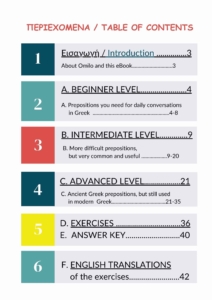Learning prepositions in Greek can be both exciting and challenging.
Prepositions, or “προθέσεις” , play an important role in connecting words and making sentences.
While some Greek prepositions have clear equivalents in English, others require deeper understanding due to differences in grammatical structure and usage.
Key Features of Greek Prepositions
-
Case Sensitivity:
Greek prepositions change the form of the words that come after them.—namely the genitive, accusative, and dative
(though the dative comes from Ancient Greek, and is mostly replaced by other constructions in Modern Greek).
The case impacts the meaning of the preposition.For example:
με –> means “with” depending on the context. It requires the accusative case
For example;
Μένω με την αδερφή μου. Μιλάω με τον φίλο μου
-
2. Context and Idiomatic Usage
Some prepositions in Greek convey different meanings depending on the context.
σε –> means “in, at, to”, depending on the context. You can use it to indicate a location or direction.
(It requires the accusative case)For example;
Μένω στην Αθήνα –> I live in Athens
Πάω στο σούπερ μάρκετ. –-> I go to the supermarket
Common Prepositions to Learn First – For Beginners
Here are some essential Greek prepositions every Beginner needs, and their basic meanings:
σε (se): in, on, at
με (me): with, by
από (apó): from
για (yiá): for, about
χωρίς (chorís): without
Prepositions for Intermediate and Advanced Levels
It is not that obvious to determine which preposition is for which level, since it also depends on the person, which vocabulary he chooses to use, or needs.
The “advanced prepositions” are usually related to Ancient Greek Language, which is still extensively used in modern Greek, especially in academic circles, newsletters, literature, but also daily language.
Some examples below
Άνευ = χωρίς, without
Syntax; άνευ + Genitive
expressions ;
-άνευ λόγου και αιτίας = without rhyme or reason, unreasonably, for no reason
Ήταν θυμωμένος μαζί μου άνευ λόγου και αιτίας. Δεν έκανα τίποτα. —> He was angry with me without rhyme or reason. I didn’t do anything.
++++++++++++++++++
εις= σε (=μέσα) = in, onSyntax; εις + Accusative
–εις βάθος: σε βάθος (in depth)
Θα μελετήσω την έρευνα εις βάθος. –> I will study the research in depth.
++++++++++++++++++
–εις βάρος = σε βάρος (at sb’s expense, against) + Genitive
Οι αλλαγές που έγιναν στο πρόγραμμα είναι εις βάρος του Κώστα. –> The changes made to the program are against Kostas.
+++++++++++++++++++
Tips for Mastering Greek Prepositions
Practice with Examples:
Memorizing prepositions by itself can be tricky, so it is easier to learn them within sentences. For instance, instead of just memorizing σε, learn it as part of phrases like σε λίγα λεπτά (se líga leptá) – “in a few minutes.”Understand Fixed Expressions:
Many prepositions form fixed phrases in Greek. For example, “για πάντα” (yiá pánta) means “forever,” even though the literal translation might seem different.Focus on Cases:
Pay attention to the case endings of nouns that follow prepositions. This will improve both your understanding of grammar and your sentence structure.Listen to Native Speakers:
Watching Greek movies, listening to songs, or engaging in conversation can help you understand how prepositions are used naturally.
By practicing consistently and immersing yourself in the language, you’ll soon become comfortable with Greek prepositions.
Καλή επιτυχία! (Kalí epitichía! – Good luck!)
Let us help you with a special Preposition eBook
Of course, at Omilo we know it is not so simple to practice, when you do not live in Greece, or you are not in regular contact with Greeks.
Therefore we made a special eBook for you, to help you out.In this e-book, we will analyze some very important prepositions in the Greek language, their meaning, and their syntax.
We will explain this part of Greek grammar, and at the same time also give examples of several sentences (translations in English included), exercises, and answer key.
This eBook is mainly written for students at intermediate and advanced language levels.
The more you proceed in the Greek language, the more you will realize that you need prepositions, to form proper sentences.However, even when you are a beginner in the Greek language, you also need to know some prepositions, to be able to start small conversations.
Therefore, you will find the easy and basic prepositions (with their basic usage) at the beginning of this eBook, and the more advanced prepositions after that.
 In this eBook you will find the following.
In this eBook you will find the following.Beginner level;
the 1st part, explaining simple basic prepositions, which you need on a daily basis
Intermediate level;
more difficult prepositions, but very common and useful
Advanced level;
the 3rd part is about ancient Greek prepositions, but still used in modern Greek
Some of them are often used as expressions- EXTRA; Exercises with Answer Key and translations
Practicing is important, so special exercises will help you out. With the answer key you will be able to also practice yourself. Because the vocabulary in the exercises can be challenging, we have also added an English translation of the exercises at the end of the eBook.
This eBook is a Printable PDF document, 44 pages.
-
Are you ready to learn more about Greek prepositions, and practice?
then this eBooks is exactly what you are looking for










